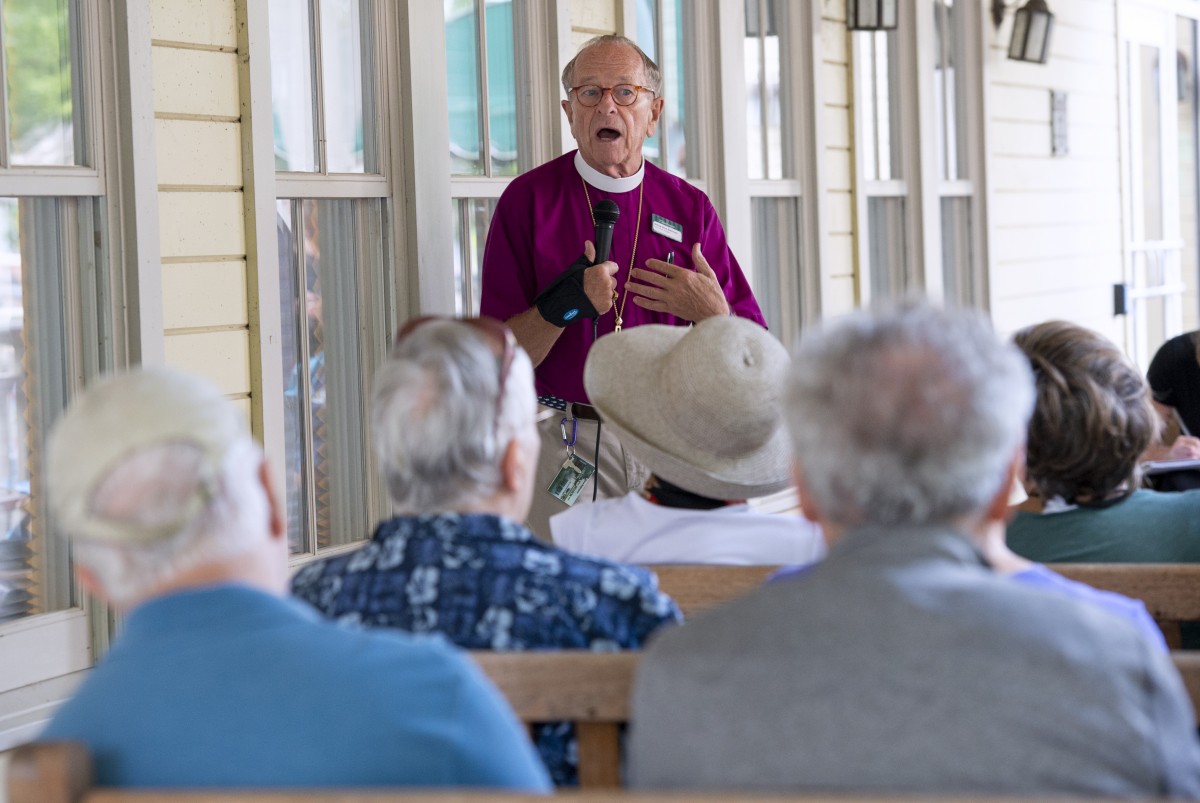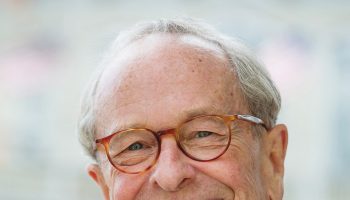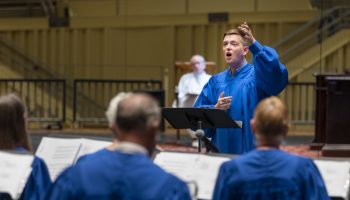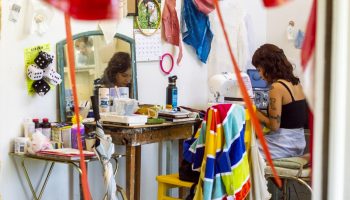The Rt. Rev. V. Gene Robinson opened the 9:30 a.m. Chautauqua Institution Leadership Porch Discussion Wednesday, July 18, at the Hultquist Center by answering what he said is the most frequently asked question he has heard since he began his position as the vice president of religion at Chautauqua: “How are you doing? Are you liking the position?”
“And to that I always respond ‘I am loving it,’ ” he said.
Robinson discussed several topics that he thought would be of interest to the community, including using the theme from the 10:45 a.m. lecture platform as a jumping-off point for the 2 p.m. Interfaith Lecture Series, expanding the Institution’s understanding of interfaith worship and how his recent entrance to Chautauqua allows him to see and question things that others may not even think about.
The Interfaith Lecture Series, Robinson said, is incredibly important to him and its expansion is something to which he and Maureen Rovegno, director of religion, are dedicated.
“It is important to say that my colleague Maureen Rovegno and I are dedicated to moving more and more into an interfaith direction,” Robinson said.
Robinson also said that despite his and Rovegno’s best attempts to connect the weekly interfaith theme to that of the larger weekly theme, there are some instances in which they have decided to make the 2 p.m. lecture a “standalone.”
“Sometimes it just doesn’t make sense to use the same topic for the interfaith lecture,” Robinson said. “For example, having a religious take on Yo-Yo Ma would be particularly challenging. So for that week, we have a standalone lecture (series) scheduled about the Supreme Court’s Masterpiece Cakeshop ruling.”
According to Robinson, some weeks actually lend themselves directly to a discussion through an interfaith lens. For example, during the 2019 season, Week One’s theme will be “Moments That Changed the World,” to which the Interfaith Lecture Series will respond with “Religious Moments That Changed the World.”
“But we’re not necessarily interested in the Reformation or more well-known instances,” Robinson said. “We are looking at things like the new book about how Mrs. Martin Luther Jr.’s religiosity affected the Rev. Martin’s decisions.”
To further enhance the interfaith experience Chautauqua offers, Robinson said that the 2019 season with build on the Interfaith Friday Series with more faith leaders from various “faith perspectives.” Each speaker will be asked questions that are created to draw connecting threads through the religious spectrum, such as “Do you have a sacred text that says yours is the only true religion?” and “Do you have extremists in your religion?”
Each lecture will be recorded and sold packaged together as what Robinson called “sort of an interfaith adult study.”
Robinson said that he is particularly interested in balance through discussion about the different religious perspectives.
“In the religion department, what we mean by ‘balance’ refers to questions like, ‘Do we have some kind of balance from evangelical Christianity through more mainstream Christianity?’ ” he said.
The department’s dedication to interfaith study does not end at the lectures, however.
“Maureen and I have a long-term goal that we will eventually have a year-round interfaith building,” Robinson said. “We are asking ourselves questions about it already, such as, ‘What would we do there?’ and ‘What could we do there that we cannot do now?’ ”
Additionally, Robinson said that as “the new kid on the block,” he has noticed some other areas of potential improvement, specifically in reference to the treatment of the Department of Religion as compared to the other departments within Chautauqua Institution.
“One of the things I have noticed is that I think there are ways in which the religion department is treated almost as a second-class citizen here,” he said.
Specifically, he said that before he was hired as the vice president of religion, the Department of Religion was the only pillar without a member at that executive level. There has also been a major movement to gather data about all of the departments through the information taken when a gate pass is scanned before a lecture or event. Many of the Department of Religion events, however, are held in the Hall of Philosophy, where the openness and the lack of main entrances makes it hard to scan gate passes and record that information.
“Maybe in the next two years, we will be able to incorporate a technology that could pick up that information without scanning, but just from being in the vicinity,” Robinson said.
Finally, the interdepartmental collaboration for deciding the weekly themes does not include the Department of Religion in the capacity he would like, Robinson said.
“Wouldn’t we benefit from having all of these incredibly smart people in a room helping us decide what to do with the interfaith lectures?” Robinson said. “Or maybe we could set one week and allow the 10:45 a.m. lectures to work from that.”
Robinson’s discussion was followed by a Q-and-A in which the audience members covered topics such as Robinson’s introductions at the Sunday morning worship services that included all faiths, the inclusion of a science branch in the Department of Religion and opening the idea of “interfaith” to spiritual perspectives outside of religions.
One of the community members, the Rev. Ann Marie Perkins, who works at an interfaith children’s school in Warren, Ohio, was interested in broadening the idea of “interfaith.”
“Many of the parents of the children I work with are millennials and identify under the ‘spiritual, not religious’ label,” Perkins said. “How do you think that fits into the interfaith spectrum?”
Robinson said the Department of Religion has thought robustly about questions like this, and to what the extent the various viewpoints on the spiritual spectrum are included in the Interfaith Lecture Series.
“The inclusion of people who identify as ‘spiritual, not religious’ and others is very important to the interfaith platform,” he said. “Maureen and I are absolutely committed to the inclusion of this spectrum.”





